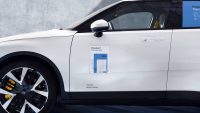The Society of Motor Manufacturers and Traders (SMMT) has called for the plug-in car grant to be preserved and the addition of a consumer VAT exemption.
New data revealed today by the SMMT shows only 4.6 per cent of new battery electric vehicles registered in 2020 were for private buyers.
This is a significant difference to 8.7 per cent of fleet and business buyers who registered a new BEV in 2020.
The SMMT has estimated that by keeping the plug-in car grant at its former level and introducing a VAT exemption on EVs for consumers, their uptake would increase by nearly two thirds by 2026.
Business and company car drivers currently receive much stronger incentives to make the switch, as well as longer-lasting motivation from reduced purchase taxes.
However, both private and business buyers were affected by changes announced last week that cut the plug-in car grant from £3,000 to £2,500 while also reducing the cars eligible for the incentive to those under £35,000.
The trade body argues that despite manufacturers having invested billions ahead of the 2030 ban on selling new petrol and diesel models, and with plug-ins accounting for one in four new car models, consumer acceptance is still low.
SMMT chief executive Mike Hawes points to the need for incentives to deliver the ‘electric revolution’ the government desires by 2030.
In Germany, electric car buyers currently receive a €9,000 (£7,750) grant and Dutch drivers don’t pay VAT on BEV purchases, which is a cost saving of around 16 per cent.
He said: ‘While last year’s bumper uptake of electric vehicles is to be welcomed, it’s clear this has been an electric revolution primarily for fleets, not families.
‘Manufacturers are committed to the consumer, reducing costs and providing as wide a choice as possible of zero-emission capable vehicles with many more to come.
‘To deliver an electric revolution that is affordable, achievable and accessible to all by 2030, however, government and other stakeholders must put ordinary drivers at the heart of policy and planning.
‘We need incentives that tempt consumers, infrastructure that is robust and charging points that provide reassurance, so that zero-emission mobility will be possible for everyone, regardless of income or location.’
He added: ‘When every market is vying for these new technologies, a clear and collaborative strategy engaging all would ensure the UK remains an attractive place both to manufacture and market electric vehicles, helping us achieve our net zero ambition.’



































